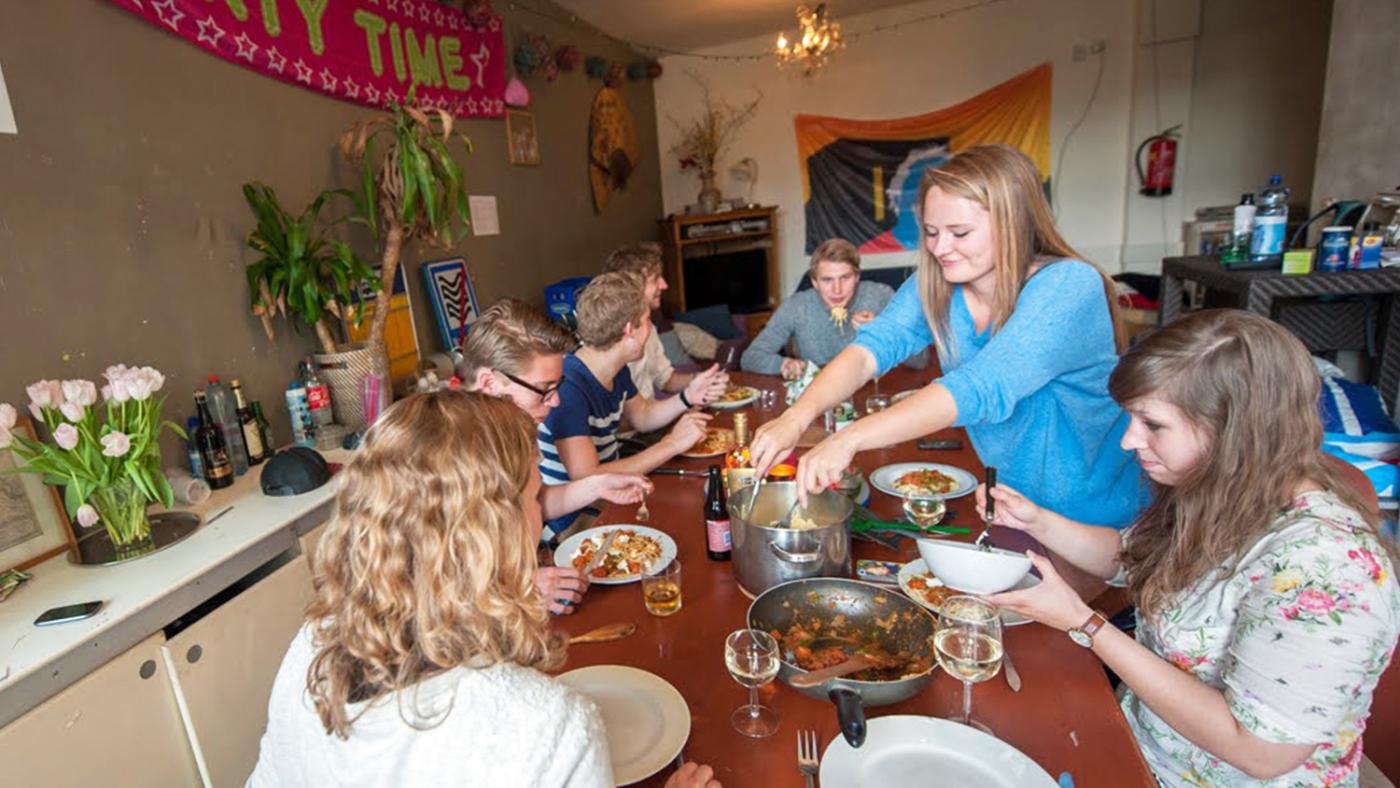SSH director on the decision to abolish 'hospiteren' in new buildings:
'The auditioning system structurally excludes certain groups of students'

One of the biggest student housing providers in the Netherlands will abolish the hospiteren system in its new buildings. Hospiteren is a practice in which room seekers are invited to visit a house that has a vacant room. The students already living in that house then choose their new roommate based on who they like best. Dutch media quickly picked up the news after DUB reported it last week.
SSH Director Rob Donninger is not surprised by all the attention on SSH and the debate that ensued. “The question of how sustainable hospiteren actually is has been relevant for some time, especially among policymakers and politicians.”
This form of auditioning will no longer be allowed in SSH's new complex on Opaalweg, the Baobab, and the High Five. Together, these buildings will provide over 600 rooms, some of which are yet to be completed. Instead of hospiteren, rooms in these and any new buildings will be allocated to students according to their position on the waiting list. The auditioning system will be maintained in all current SSH complexes, which offer 6,500 rooms.
Surprised
Donninger says SSH has received “a lot of praise" from people who feel victimised by annoying hospiteren practices. “These positive reactions didn't only come from current students, but also from people in their sixties who had to deal with that in the past.”
At the same time, he’s aware of the negative or dismissive reactions from students who find it important to choose their roommates. A quick poll on DUB's Instagram obtained 90 responses, of which 40 percent were favourable to the measure and 60 percent were against it.
The SSH director understands both points of view, but observes that “at a time when we are all concerned with inclusion, especially the younger generations, I'm a little bit surprised that our approach seems to evoke so much resistance.”
Increasing inequality
According to Donninger, the measure aims to ensure equal opportunities for students who are a bit different from the majority. He admits to having learned a lot about this in recent years. In an interview with DUB five years ago, he didn't seem keen on introducing alternatives to the hospiteren system, but now he identifies “an increasing inequality” between certain groups of students that can't be justified by a "competitive housing market" alone. “I’ve changed my mind and I’m happy I can do something about it. After all, we are building new complexes whose residents will not be used to the auditioning system, so we can offer an alternative.”
Stream of complaints
Remarkably, a study commissioned by SSH three years ago (only available in Dutch, Ed.) concluded that there is “no reason, let alone evidence, that the hospiteren system leads to exclusion”. Research agency Rigo observed that auditioning is beneficial to students insofar as it promotes social cohesion in the house. Seventy-five percent of SSH residents consulted at the time considered auditioning useful.
According to the director, SSH commissioned that study following a stream of complaints about the system. “We wanted to know to what extent hospiteren promotes discrimination. Fortunately, the answer turned out to be not at all. If there was outright discrimination, we would have stopped it altogether, right away."
At the same time, Donninger says the Rigo survey also showed that many students did not feel comfortable at all while auditioning. The study reveals that 30 percent of SSH residents would have preferred not to audition. What's more, 48 of the 536 respondents reported negative experiences while auditioning, such as inappropriate questions or excessive drinking.
Certain groups were underrepresented in the survey, such as disabled students and students with a bicultural background, so SSH commissioned a follow-up study to examine them in more detail.
Although not all of these respondents were negative about the hospiteren system and their experiences with it, the survey revealed that members of these groups encounter specific obstacles. A significant proportion of respondents felt that they were less likely to find a room in this way.
“We have all learned a lot these past few years,” Donninger adds. “We are more aware of what a bad experience can do to people’s self-image. We know more about how people select roommates. Unconsciously, people tend to choose those who look like them, which partly explains why students at the vocational level (MBO) have a very hard time getting through an audition round. Less communicative students have problems too."
“Maybe the comparison is too sharp, but there are elements in the hospiteren system that resemble institutional racism. I don’t mean that it’s racist, but rather that the system structurally excludes people even though no one is ill-intended."

SSH Director Rob Donninger. Photo: Sam de Weerd
Tenants' association weighs in
Two years ago, the tenants’ association BoKs reacted to the studies by advising SSH to experiment with alternative ways of allocating rooms to see if this would help vulnerable students. However, BoKs maintained that auditions should remain the standard in the new complexes.
The association partly pinned its hopes on a better provision of information to student houses and a better image for the practice of assigning students to a house. After all, SSH already did that with students who had participated in many auditions but didn't manage to score a room. BoKs tells DUB that they are currently consulting their base about whether the association should maintain this position now.
According to Donninger, SSH has held "productive" discussions with BoKs in which both parties agreed with each other, for the most part. However, he says that many of the alternatives mentioned by the association were "quick fixes" that “did not offer a structural solution”. For instance, he doesn’t understand how informing residents better would help. “Information? So, you have to tell people that they can choose who they want, as long as they choose someone they don’t want?”
“Besides, I wonder if anyone would be happy if we started placing more students in houses ourselves. If we did that, the residents wouldn't get the chance to choose their roommate and the new roommate would feel as though they are being forced upon the group. I think we have come up with a much better idea: we will offer everyone who's been on the waiting list for the same amount of time the opportunity to choose between a room for which they have to audition and a room that doesn't require that. This increases equality of opportunity. It’s still a relatively small number of rooms, but you have to start somewhere.”
Little difference
But isn’t there a risk that houses that do not choose their roommates will be less cohesive and therefore have more conflicts? SSH carried out an experiment in the Mammoet building to find that out. Some of the houses could hospiteer and some could not. According to Donninger, the students living in houses that could choose their roommates were more likely to describe their home as cohesive, compared to the ones who could not. “These results make sense. Our concern was if the satisfaction levels were okay in the houses that could not run auditions, and they were. The differences were small.”
Finally, the SSH director points out that many rooms are specifically or randomly allocated across the Netherlands. “There are no indications that this leads to problems.” He emphasises that SSH does not want to interfere with the rights of those living in houses that are still organising hospiteer evenings. “It’s not that hospiteren is all bad, especially if you only live with four people and have to share everything. I can imagine students would want to know who they will be sharing their home with. However, in larger complexes, where many more people share a hallway or department, this seems less important to me as there will always be people around with whom they get along well."
Donninger concludes by saying he is “not necessarily against hospiteren. But, as a housing corporation, we also have a social duty. If hospiteren means certain groups of students will have less access to the housing market, then we must do something about that.”
Last month, DUB asked students on campus what they thought of the 'hospiteren' system. This is what they said:
